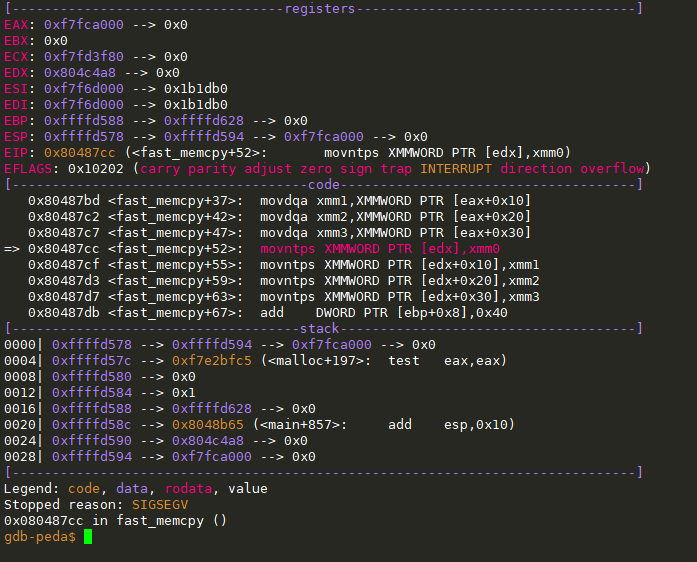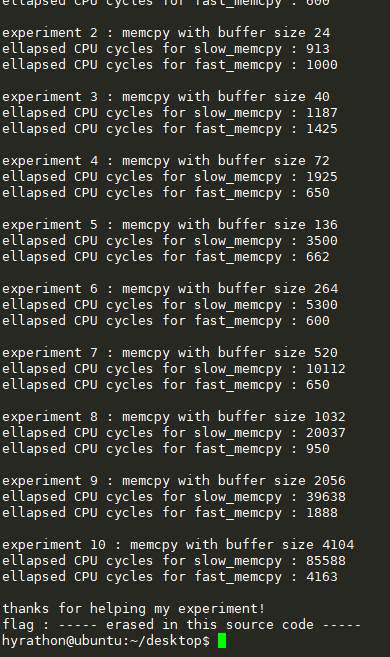感觉这道题考的是堆分配时字节对齐问题.
首先上代码
// compiled with : gcc -o memcpy memcpy.c -m32 -lm
#include
#include
#include
#include
#include
#include
#include
unsigned long long rdtsc(){
asm("rdtsc");
}
char* slow_memcpy(char* dest, const char* src, size_t len){
int i;
for (i=0; i= 64){
i = len / 64;
len &= (64-1);
while(i-- > 0){
__asm__ __volatile__ (
"movdqa (%0), %%xmm0\n"
"movdqa 16(%0), %%xmm1\n"
"movdqa 32(%0), %%xmm2\n"
"movdqa 48(%0), %%xmm3\n"
"movntps %%xmm0, (%1)\n"
"movntps %%xmm1, 16(%1)\n"
"movntps %%xmm2, 32(%1)\n"
"movntps %%xmm3, 48(%1)\n"
::"r"(src),"r"(dest):"memory");
dest += 64;
src += 64;
}
}
// byte-to-byte slow copy
if(len) slow_memcpy(dest, src, len);
return dest;
}
int main(void){
setvbuf(stdout, 0, _IONBF, 0);
setvbuf(stdin, 0, _IOLBF, 0);
printf("Hey, I have a boring assignment for CS class.. :(\n");
printf("The assignment is simple.\n");
printf("-----------------------------------------------------\n");
printf("- What is the best implementation of memcpy? -\n");
printf("- 1. implement your own slow/fast version of memcpy -\n");
printf("- 2. compare them with various size of data -\n");
printf("- 3. conclude your experiment and submit report -\n");
printf("-----------------------------------------------------\n");
printf("This time, just help me out with my experiment and get flag\n");
printf("No fancy hacking, I promise :D\n");
unsigned long long t1, t2;
int e;
char* src;
char* dest;
unsigned int low, high;
unsigned int size;
// allocate memory
char* cache1 = mmap(0, 0x4000, 7, MAP_PRIVATE|MAP_ANONYMOUS, -1, 0);
char* cache2 = mmap(0, 0x4000, 7, MAP_PRIVATE|MAP_ANONYMOUS, -1, 0);
src = mmap(0, 0x2000, 7, MAP_PRIVATE|MAP_ANONYMOUS, -1, 0);
size_t sizes[10];
int i=0;
// setup experiment parameters
for(e=4; e<14; e++){ // 2^13 = 8K
low = pow(2,e-1);
high = pow(2,e);
printf("specify the memcpy amount between %d ~ %d : ", low, high);
scanf("%d", &size);
if( size < low || size > high ){
printf("don't mess with the experiment.\n");
exit(0);
}
sizes[i++] = size;
}
sleep(1);
printf("ok, lets run the experiment with your configuration\n");
sleep(1);
// run experiment
for(i=0; i<10; i++){
size = sizes[i];
printf("experiment %d : memcpy with buffer size %d\n", i+1, size);
dest = malloc( size );
memcpy(cache1, cache2, 0x4000); // to eliminate cache effect
t1 = rdtsc();
slow_memcpy(dest, src, size); // byte-to-byte memcpy
t2 = rdtsc();
printf("ellapsed CPU cycles for slow_memcpy : %llu\n", t2-t1);
memcpy(cache1, cache2, 0x4000); // to eliminate cache effect
t1 = rdtsc();
fast_memcpy(dest, src, size); // block-to-block memcpy
t2 = rdtsc();
printf("ellapsed CPU cycles for fast_memcpy : %llu\n", t2-t1);
printf("\n");
}
printf("thanks for helping my experiment!\n");
printf("flag : ----- erased in this source code -----\n");
return 0;
}
程序中自己实现了一个快速的memcpy函数, 题目要求是只要能够跑完所有的测试用例就可以拿到flag, 但是随意输入一些会segment fault.
这个神奇的浮点运算operand movntps没见过, 查一下它的定义, 发现有这样一个报错点:
The destination operand is a 128-bit or 256-bit memory location. The memory operand must be aligned on a 16-byte (128-bit version) or 32-byte (VEX.256 encoded version) boundary otherwise a general-protection exception (#GP) will be generated.
也就是说它的目的地址需要是0x10对齐的, 但是看我们的程序, 此时操作目标是[edx] = 0x804c4a8, 明显没有0x10对齐, 这就是报错的原因.
回到源码里边溯源, 发现edx这个值是malloc返回值, 也就是说堆上返回的值.
假设我们现在使用这样一个数字序列让程序执行
8 16 32 64 128 256 512 1024 2048 4096
通过在malloc函数后面下断点可以查看堆上的布局. 在堆上首先分配0x8的chunk头, 接下来是8位对齐的空间. 由于程序没有调用过free, 所以堆是递增的. 8共分配了8+8=0x10个字节, 它本身是16位对齐的, 所以它的下一个16开始位置是对齐的. 16需要分配8+16=0x18位. 这样一来下一个就不对齐了. 这种效应在64之前没有影响, 因为64位以下调用的是slow_memcpy, 但是在64以上开始调用fast_memcpy, 就会崩溃.
解决这个问题很容易, 在每一个会导致不对齐的数字上+8, 那么就对齐了:
8 24 40 72 136 264 520 1032 2056 4104
注意8之后每一个都不对齐, 都加8就好了.
就不直接贴flag了, 做到这里终于把toddler's bottle做完了, 前边的好多题比较简单, 当时做没有写writeup. 喘一口气, 告一段落, 接下来继续前进!

